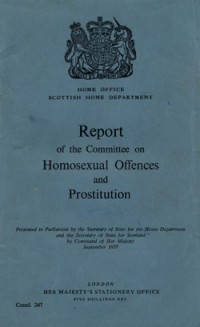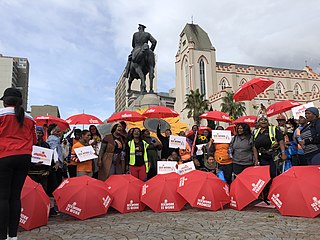Related Research Articles

A victimless crime is an illegal act that typically either directly involves only the perpetrator or occurs between consenting adults. Because it is consensual in nature, whether there involves a victim is a matter of debate. Definitions of victimless crimes vary in different parts of the world and different law systems, but usually include possession of any illegal contraband, recreational drug use, prostitution and prohibited sexual behavior between consenting adults, assisted suicide, and smuggling among other similar infractions.

The Report of the Departmental Committee on Homosexual Offences and Prostitution was published in the United Kingdom on 4 September 1957 after a succession of well-known men, including Lord Montagu of Beaulieu, Michael Pitt-Rivers, John Gielgud, and Peter Wildeblood were convicted of homosexual offences.

Herbert Lionel Adolphus Hart was an English legal philosopher. He was the Professor of Jurisprudence at Oxford University and the Principal of Brasenose College, Oxford. His most famous work is The Concept of Law, which has been hailed as "the most important work of legal philosophy written in the twentieth century". He is considered one of the world's foremost legal philosophers in the twentieth century.
The harm principle holds that the actions of individuals should be limited only to prevent harm to other individuals. John Stuart Mill articulated the principle in the 1859 essay On Liberty, where he argued that "The only purpose for which power can be rightfully exercised over any member of a civilized community, against his will, is to prevent harm to others." An equivalent was earlier stated in France's Declaration of the Rights of Man and of the Citizen of 1789 as, "Liberty consists in the freedom to do everything which injures no one else; hence the exercise of the natural rights of each man has no limits except those which assure to the other members of the society the enjoyment of the same rights. These limits can only be determined by law." It finds earlier expression in Thomas Jefferson's 1785 "Notes on the State of Virginia," Query 17 (Religion) in which he writes, "The legitimate powers of government extend to such acts only as are injurious to others."
The Homosexual Law Reform Society was an organisation that campaigned in the United Kingdom for changes to the set of laws which criminalised homosexuality at the time.

Criminalization or criminalisation, in criminology, is "the process by which behaviors and individuals are transformed into crime and criminals". Previously legal acts may be transformed into crimes by legislation or judicial decision. However, there is usually a formal presumption in the rules of statutory interpretation against the retrospective application of laws, and only the use of express words by the legislature may rebut this presumption. The power of judges to make new law and retrospectively criminalise behaviour is also discouraged. In a less overt way, where laws have not been strictly enforced, the acts prohibited by those laws may also undergo de facto criminalization through more effective or committed legal enforcement. The process of criminalization takes place through societal institutions including schools, the family, and the criminal justice system.

The Criminal Law Amendment Act 1885, or "An Act to make further provision for the Protection of Women and Girls, the suppression of brothels, and other purposes," was an Act of the Parliament of the United Kingdom, the latest in a 25-year series of legislation in the United Kingdom of Great Britain and Ireland beginning with the Offences against the Person Act 1861. It raised the age of consent from 13 years of age to 16 years of age and delineated the penalties for sexual offences against women and minors. It also strengthened existing legislation against prostitution and homosexuality. This act was also notable for the circumstances of its passage in Parliament.
Gay cruising describes the act of searching about a public place in pursuit of a partner for sex. This activity has existed in England and Wales since at least the 17th century and has a colourful legal history. It differs from prostitution in that the parties involved do not seek money for sex, and from gay nightclubs or bathhouses in that they are not on private premises, although they may take place on private land to which the public have been granted access.

In Great Britain, the act of engaging in sex as part of an exchange of various sexual services for money is legal, but a number of related activities, including soliciting in a public place, kerb crawling, owning or managing a brothel, pimping and pandering, are illegal. In Northern Ireland, which previously had similar laws, paying for sex became illegal from 1 June 2015.

In criminology, public-order crime is defined by Siegel (2004) as "crime which involves acts that interfere with the operations of society and the ability of people to function efficiently", i.e., it is behaviour that has been labelled criminal because it is contrary to shared norms, social values, and customs. Robertson (1989:123) maintains a crime is nothing more than "an act that contravenes a law". Generally speaking, deviancy is criminalized when it is too disruptive and has proved uncontrollable through informal sanctions.

Patrick Arthur Devlin, Baron Devlin, PC, FBA was a British judge and legal philosopher. The second-youngest English High Court judge in the 20th century, he served as a Lord of Appeal in Ordinary from 1960 to 1964.

The Sexual Offences Act 1967 is an act of Parliament in the United Kingdom. It legalised homosexual acts in England and Wales, on the condition that they were consensual, in private and between two men who had attained the age of 21. The law was extended to Scotland by the Criminal Justice (Scotland) Act 1980 and to Northern Ireland by the Homosexual Offences Order 1982.
The ages of consent vary by jurisdiction across Europe. The ages of consent – hereby meaning the age from which one is deemed able to consent to having sex with anyone else of consenting age or above – are between 14 and 18. The vast majority of countries set their ages in the range of 14 to 16; only four countries, Cyprus (17), the Republic of Ireland (17), Turkey (18), and the Vatican City (18), set an age of consent higher than 16.
Vigo Auguste Demant (1893–1983), known as V. A. Demant, was an English Anglican priest, theologian, and social commentator. He was one of the 14 committee members who served on the Wolfenden Report on Homosexual Offences and Prostitution.
Articles in social and political philosophy include:

A sodomy law is a law that defines certain sexual acts as crimes. The precise sexual acts meant by the term sodomy are rarely spelled out in the law but are typically understood by courts to include any sexual act deemed to be "unnatural" or "immoral". Sodomy typically includes anal sex, oral sex, manual sex, and bestiality. In practice, sodomy laws have rarely been enforced against heterosexual couples, and have mostly been used to target homosexual couples.

Prostitution laws varies widely from country to country, and between jurisdictions within a country. At one extreme, prostitution or sex work is legal in some places and regarded as a profession, while at the other extreme, it is considered a severe crime punishable by death in some other places. A variety of different legal models exist around the world, including total bans, bans that only target the customer, and laws permitting prostitution but prohibiting organized groups, an example being brothels.

The decriminalization of sex work is the removal of criminal penalties for sex work. Sex work, the consensual provision of sexual services for money or goods, is criminalized in most countries. Decriminalization is distinct from legalization.

The Modern Slavery Act 2015 is an Act of the Parliament of the United Kingdom. It is designed to combat modern slavery in the UK and consolidates previous offences relating to trafficking and slavery. The act extends essentially to England and Wales, but some provisions apply in Scotland and Northern Ireland.
The Hart–Devlin debate was a famous debate in the mid-twentieth century between legal philosophers Patrick Devlin and H. L. A. Hart about whether the law is a suitable tool for the enforcement of morality. The debate arose in the context of a proposal to decriminalize homosexuality in the United Kingdom. Devlin argued that the law is a suitable tool to enforce morality, while Hart disagreed.